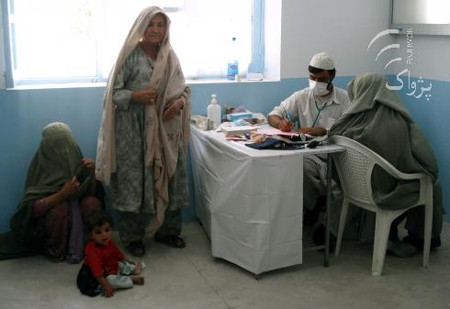By Hadi Ghafari
Many women in central Daikundi province are dying unnecessarily because there are no female doctors in any of the districts.
The provincial council has accused the nongovernmental organisation contracted for the last four years to provide health services in Daikundi of not doing its job.

PAN, Mar. 23, 2011: For the province of 380,000 people, there are 15 nurses and midwives, two hospitals, 13 basic healthcare centres, eight public healthcare centres and 15 mobile healthcare centres. There was one female doctor in the main hospital in Nily two years ago, but she is no longer there.
Tahira Muradi, a member of the provincial council, said she had heard of at least 12 women who suffered from pregnancy-related illnesses and because they could not share them with a male doctor, the illness either got worse or the women died. The most common illnesses include uterine inflammation, bleeding and a breached birth.
Five women traveled to Nily city, the provincial capital, seeking treatment, but there was no female surgeon and their families would not let them be seen by a male doctor, she said.
She said the problem existed throughout Daikundi.
For the province of 380,000 people, there are 15 nurses and midwives, two hospitals, 13 basic healthcare centres, eight public healthcare centres and 15 mobile healthcare centres. There was one female doctor in the main hospital in Nily two years ago, but she is no longer there.
The nurses and midwives are based in the district centres, but for women in the villages, this can still be too far. There is no public transport and so many people travel by donkey. Reaching a district centre can take hours, or sometimes a whole day.
Travelling to another province is out of the question as the cost is too high and many of the roads are impassable.
There are no provincial statistics for the number of women dying either in childbirth or from complications relating to their pregnancy.
However, Muradi said anecdotal evidence suggested women either died at home or on the way to the clinic.
Two years ago, the Ministry of Public Health announced that an Afghan woman dies every 20 minutes in child birth or while pregnant. However, they claim that this number has fallen due to improved health services.
Muradi asked the ministry to pay more attention to the health of women.
Hussain Ali Muntazeri, head of the provincial council, said part of the problem was that health services provided by Bakhtar Development Network (BDN), an Afghan non-governmental organisation contracted by the government, are insufficient and of low quality.
Many people say that the clinics run by BDN have no medicine and that its management is involved in corruption. BDN is supervised by the Ministry of Public Health and Muntazeri said they had contacted the ministry to alert them to the complaints of residents.
“If this organisation cannot provide health services for people, then the ministry should give the contract to another organisation,” he said.
Dr. Mohammad Amin, a member of the provincial health department, said it was true that there was a lack of female doctors in the province. Under their contract with the health ministry, BDN is responsible for employing female doctors as well as providing health services, he said.
He said there were many families who would not let their wives be seen by a male doctor due to tradition and custom.
BDN did hire a female doctor for Tajikistan two years ago, but she stayed only one year.
Qurban Ali Uruzgani, the governor of Daikundi, said he asked the ministry to cancel BDN’s contract and give it to someone who can provide health services and employ female doctors.
However, Ghulam Ali Muhibeyar, head of BDN in Daikundi, said the governor and other officials were entitled to their personal opinions. However, he insisted BDN was making efforts to solve the health problems of people in Daikundi.
Muhibeyar did not answer a question about why his company has not hired more female doctors.
Last year, BDN officials said the problem was that female doctors were not prepared to work in the remote province of Daikundi for the low salary offered to them.
Two years ago Raihana Azad, a member of the provincial council, raised the issue of the province’s health problems with Kai Eide, then the UN’s representative to Afghanistan. She said that many surgeries were taking place in rooms lit with hurricane or hand-held lights. Nothing was done about the situation.
Suraya Dalil, the acting minister of public health, has said that within the next five years 95 percent of Afghans will have access to health services, that the mortality rate of mothers and infants will decrease 50 percent and that 450 new healthcare centres will be built throughout Afghanistan.
She did not specify how Daikundi’s health services would improve.



